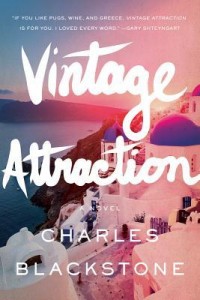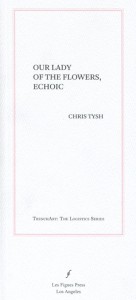Over at a mock Poetry Foundation Jim Behrle’s chimed in about the Kill List: his being upset about it, among other things, as well as his attempts to contact the publisher(s) to see if they’d “comment on any efforts they made to fact check the poem?”
I mean, really? Really? And I’m with Mark Johnson 1000 literal (ha ha) % when he says that Behrle’s piece is “so embarrassing.”
And how embarrassing, also, the way in which so many others have reacted to this Kill List. And how embarrassing, also, that CAConrad’s heaped abuse on Mark for speaking up in the poem’s defense, comparing (after other insults) Mark’s “stupidity” to the “plaque on very filthy teeth.”
And how embarrassing (but not surprising) that Conrad’s little drones let him get away with shit like this.
This Kill List’s turned out to be a great litmus test, indeed. Blah, blah.
Erin Lyndal Martin’s Response to the Anonymous Letter Addressed to Sandra Simonds in Response to Her Open Letter to The Poetry Foundation
Dear Buzz Poet,
This is an open letter in response to your letter addressing Sandra Simonds’ open letter to the Poetry Foundation.
One basic fact missing from your letter is that you seem to forget that poetry is work: “The difference between poets and the general public is that some of us, like you, Sandra, are fortunate enough to have an audience and a platform to reach them. In today’s rocky economic climate, one governed by debt and political deficit, I do not think it is in the best interest of your audience or the poetry community to model such irresponsible behavior in asking for a financial handout from the Poetry Foundation to support the poets you hold in such romanticized esteem.” Simonds has an audience and platform, mostly from within the literary community, because she has worked hard to build those connections through her work and social networking. Much of the work associated with poetry is thankless and unpaid; Simonds’ audience includes many of her peers who face her same financial reality. They may put in hours editing literary magazines that don’t make a profit, or they may write countless unpaid book reviews in an attempt to garner support and audiences for other poets. They publicize and promote poetry. Is it, indeed, a “handout” when one is asking to receive support from a foundation for forwarding the same work as that foundation? The Poetry Foundation’s website says that they are “committed to a vigorous presence for poetry in our culture.” Is Simonds, who writes, teaches, and reviews contemporary poetry not furthering the same agenda?
One question that lingers for many poets who founder without the support of the Poetry Foundation or similar arts organizations is what those organizations do with their money if not support poets. In President John Barr’s 2011 Year-in-Review letter posted on the foundation’s website (no similar letter for 2012 seems to be available), Barr is directly evasive: “Not all of the ‘hard metal’ that nurtures and contains the poetic energy at the Foundation is visible to the naked eye. The strategic plan, the annual forty-page operating budget, managing the endowment.” So why not make it visible to the naked eye? Why not publish the budget or the strategic plan? And why is the latest Audited Financial Statement READ MORE >
Call for Submissions: “Poetry Sucks!”
I was asked to pass this along, so, here it is! Good luck.
Call For Submissions
The upcoming Third Man Books anthology to be titled Poetry Sucks! An Anthology of Poetry, Music, and All Sorts of Bad Language is accepting submissions.
Third Man Records co-founders Jack White and Ben Swank originally conceived the record label to house, produce, and distribute Jack’s music projects. However, they have always intended to broaden the endeavor’s scope. TMR now features many music artists other than Jack and has taken on new projects such as distributing the legendary Sun and Paramount record labels. Film is another avenue TMR has begun to explore. And not surprising to many, Jack and Ben happen to be language lovers.
Who Wears a David Foster Wallace Shirt?
I’m hesitant to discuss Wallace post-suicide because there’s a holiness that somehow feels dry-humped when he’s discussed online. I approached The Pale King with this kind of hesitation and also with large amounts of excitement, anxiety, and eventually, shame. I didn’t feel right reading that book. In many ways, I wish it didn’t exist, even though it’s brilliant in set piece after set piece. There’s been more books since, and each have appeared in a skin-crawling “wait-we-have-more” fashion. It’s not that the books themselves are new – most are old essays, obscure interviews, a graduation speech, and even, an undergrad thesis. It’s the kind of thing capitalism rots and succeeds at – mask it as honoring the work and publishing it for the fans, cash in.
25 Points: Vintage Attraction
 Vintage Attraction
Vintage Attraction
by Charles Blackstone
Pegasus Books, 2013
304 pages / $24.95 buy from Pegasus Books or Amazon
1. Charles Blackstone is the managing editor of Bookslut, which is a nice outfit with a long-standing thing going on and you can read them at: www.bookslut.com
2. I prefer to call him Charlie and he is fine with that.
3. This novel is about a guy who is in love with a famous girl in Chicago who is a wine expert and has her own restaurant thing going on and her own tv show and the guy contacts her as a fan and then they elope and then five weeks later he thinks she is cheating on him and also they aren’t even getting along really and then they are taking a trip to Greece together.
4. There isn’t any gore or devastating kind of art going on in it what it is instead is more of a vibe of like you’re on a second date with someone you really like and it’s a picnic and you just want to seem really nice because you actually think your date is really nice so you use proper grammar. Don’t even lie you know you look really cute when you dress up sometimes. I want to say this book has a tone you’d use in a job interview but that wouldn’t be helping anyone.
5. Also our narrator has an incredibly sad type of way about him which I am basically a complete sucker for but that is fine.
6. This guy in the novel is an adjunct professor.
7. It has this kind of little nervous guy thrown into a big city feel to it because he like asks this girl out and then they’re married and he has to keep up with her life.
8. Have you ever felt like you had to keep up with someone and was it exhausting.
9. I think this entire novel may be a metaphor for the history of wine. Tolstoy.
10. They’re running around Greece trying to either fix or break a marriage they’ve been in for five weeks. READ MORE >
October 22nd, 2013 / 11:09 am
Against Intramural Poetics, Poetry as Potpourri and Brooklyn Provincial: Josef Kaplan’s Kill List
 Kill List
Kill List
by Josef Kaplan
Cars Are Real, October 2013
58 pages / Available as PDF / Print Editions $15
It’s been a big year for lists in poetry. I don’t feel at all threatened or the least bit offended by Josef Kaplan’s most recent Kill List. In fact, it’s hard for me to believe anyone out there really would be. Flavorwire and Seth Abramson offended me much more. But of course, I am an oh-so jaded rich poet myself, and it’s the grandmas and granddads of U.S. Conceptual Poetry who have jaded me already. I have one urgent critique of Kaplan’s poem: and it’s that the work comes off as didactic, transparently so. And to argue for this transparency as a virtue in itself undermines the integrity of conceptualism as a vanguard movement worth rooting for in contemporary poetry. Maybe I care too much. But why not make the poem a hundred pages longer? Slam Poetry is similarly didactic…something like Elliot Darrow’s “God Is Gay” which was written up in Time magazine earlier this month. Both Darrow and Kaplan espouse a kind of viral poetics to provoke discussions about classism, racism/sexism etcetera. Darrow is a high-school thespian in North Carolina; Kaplan is part of a comfortable community of poets living in Brooklyn, N.Y. With Kaplan, it’s a witty uncreative self-awareness sharpened to a lethal edge. It’s a necessary prank, a deliberate faux pas; a pot shot at our naked emperor and his provincial court of intramural poesies. But it’s not enough.
The exciting thing Kill List accomplishes is its unique perpetuation across various comment streams and blogs online. In its first week, there have been some hilarious moments of response…one person arguing that so & so isn’t a rich poet because they only recently received tenure and the National Book Award, for instance. Some people are upset. Yes, the romantic idyll of the starving poet in a garret is entirely defunct. The trouble is that if someone is a poet and you know about them outside of your own inter-personal sphere, they’re mostly likely rich, because so much poetry is and always has been (not without the occasional, glorious exception…) for the most part conceived by and for an owning majority class. So much poetry is just like potpourri.
Here’s an attempt at close reading my favorite section of Kaplan’s poem. This stanza appears towards the end on page fifty-eight:
“Ron Silliman is comfortable.
Justin Sirois is comfortable.
Matthew Smith is comfortable.
Patti Smith is a rich poet.”
Patti Smith is a rich poet, no doubt…and an example of the constantly warping conception of what constitutes poetic labor (an oxymoron?) or what makes someone a poet, wtf is poetic. All poetry mocks the bourgeois idea of production, viz.: how much labor must one put into something for it to have any value. Anybody can do it, so therefore any poem is inherently subversive. A poem that’s no more than twenty words may win awards on a grand scale—never mind how long the poet claims it took them to write—just as they could rattle off an epic fifty-page poem in a matter of days. The poet’s “craft” so-called may reside more in their delivery, the cultivation of a persona, or some underlying concept forming the bedrock of everything they do.
Poet John Latta wrote on his blog Isola Di Rifuti in 2009 about “the insidious People-magazinification” of the little avant-garde poetry magazines he was receiving at that time from fellow poets, young and old, new and inveterate:
“[What] is it about this particular moment that sees the arrival of Lana Turner and Abraham Lincoln and Gerry Mulligan? (Trying to think of others, I do recall a Roy Rogers some years ago—and a Frank and a Marilyn and there’s Arshile still, presumably.)
All those magazines were/are still for the most part edited produced and disseminated by respective communities of poets. Needless to say, any layman potential non-poet reader will have a hard time finding them online unless they specify, for instance: “Lana Turner poetry” or better yet “Lana Turner poetry magazine”. And that particular title is a literary reference to an old pop cultural reference…way back to Frank O’Hara, who was indeed commenting outright on the just-as-insidious, albeit irresistible cult of celebrity in the late 1950s surrounding actress Lana Turner with his famous poem about her collapse.
Seth Abramson alluded to this phenomenon of poets preaching to the choir in his introduction to the Top 200 Advocates for American Poetry list on Huffington Post. But his intentions for making this list were unclear. He shot himself in the foot with the disclaimer: “Everyone has their own pantheon of favorite poets, cadres, mentors, and poet-friends…” He encouraged people to add to the list, as long as nobody used it as an opportunity to shamelessly promote their own clique, magazine, university lit department, reading series or borough of New York City:
“…lists of top poets and angry responses to such lists have the same net effect: to define poetry as a series of geographic sub-units or highly-circumscribed sub-communities, all of which are largely self-sufficient and self-contained, and therefore do little to directly promote American poetry as a national cultural phenomenon.”
Abramson’s list did something to promote its’ creator as a national cultural phenomenon, and in an only slightly more provocative way, so does Kaplan’s. Abramson casts himself as Paul Revere in the rapidly unfolding drama of poetry’s survival in the mainstream. The redcoats are the poetry haters. A lot of people don’t care about poetry because a lot of poets don’t care about people who don’t care. Or if they do, their way of caring is by writing poems with titles like “Accept Me” courtesy of their local MFA program.
October 22nd, 2013 / 11:00 am
5 Points: POOR ME I HATE ME PUNISH ME COME TO MY FUNERAL—- (by Grant Maierhofer and Kil)
“He saw her standing near the creek, near the road, near the stoplight. A stoplight looks bright red when your eyes haven’t seen sun for months. A stoplight looks like your best friend when the wind hovers low and the night springs up like some old widow slashing wounds throughout your flesh. You wait for some quickness, some instance of recognition, and nothing comes. Nothing.”
***
1) POOR ME I HATE ME PUNISH ME COME TO MY FUNERAL (PMIHMPMCTMF) is a collaboration of poems and images brilliantly paired by Grant Maierhofer and the artist Kil. Hard copies are available through EDEN CHAPBOOKS. Or you can check it all out on-line here.
2) These poems were (and are) a revelation for me. The only comparison that comes to mind is that I experienced something similar when, many years ago, I first encountered the prose poems of Max Jacob and Jean Follain in a 3-poet book titled “Dreaming The Miracle.” Maierhofer’s poems here in PMIHMPMCTMF glow wisely in the way Follian’s do. They also have, like Follain’s best efforts, a kind of sacred Sepia feel. They are, in short, quite wonderful.
3)) I’m all for religious bashing and I’m often guilty of being crude (badly crude) about it. Maierhofer though is extremely effective, wise, restrained and kind of off-handed about it. But, it’s sledgehammer wise and sledgehammer off-handed: “A perfect world if not for churches. If not for those hulking black tombs READ MORE >
October 21st, 2013 / 6:11 pm
TWOCLOSEWORDS: REFUSAL / REFUSAL

(It’s very common in horses.)
Refusal –
I was going to write Resistance / Resistance, but then I thought, No, every refusal has a fuse in it. A charge in the middle of every one of its bodies.
Refusal*-
(In a room with a Berryman forehead overlooking it)
A figure is questioned. This is the third time the figure has exhibited a writing like this, that goes on like this, that exhausts many of the other figures in the room with a Berryman forehead overlooking it. Is it sustainable? Is it excessive?
One of the other figures is questioned. What was it like, reading the writing the figure has exhibited? It was an experience, the other figure replies.
A figure is questioned. How many more experiences will they have to go through? Is it productive?
The figure replies. The figure wants to figure a female trickster, to re-figure a deflated Baubo (the original dry nurse we know from Romeo & Juliet, night demon, goddess, servant, bearded lady) for the crowded that has gathered.
This is the figure of Baubo.
Our Lady of the Flowers, Echoic by Chris Tysh
 Our Lady of the Flowers, Echoic
Our Lady of the Flowers, Echoic
by Chris Tysh
Les Figues Press, Oct 2013
144 pages / $15 Buy from Les Figues Press or SPD
As the second installment of her three part project titled Hotel des Archives, Chris Tysh took up the bold task of versifying Jean Genet’s hallucinatory first novel, Our Lady of the Flowers. The original novel, as Jean-Paul Sartre implies in his introduction, is already on the brink of being poetry itself: “Are we so far from poetry? Can it be that poetry is only the reverse side of masturbation?” Tysh, whether knowingly or not, explores this very question through the creation of this work.
The structure of the poetic translation restricts itself to two seven lined stanzas per page, a form with traces of the sonnet. And like Wordsworth said in “Nuns Fret Not at Their Convent’s Narrow Room,” those who “felt the weight of too much liberty/Should find brief solace there,” in the confines of the sonnet. It was, after all, in the ultimate form of confinement—prison—where Genet, left all to himself, found the inspiratory pressure to extricate the original work out of his mind and onto brown prison paper. However, the original, in all its poetic imagination did not have the compressed punch that regulated poetry is able to deliver, at least not throughout the entire work. Rather, the original novel reads as if trudging through the muck of Genet’s subconscious desires in order to find anything worth building metaphysical meaning out of. What Our Lady of the Flowers, Echoic succeeds in doing is adding further restraint onto the original text in order to pull out the skeletal story of the original novel, which is the story, metaphorically—through a constant changing and killing off of self—of becoming an artist.
The characters in Genet’s original version are nearly empty figures (with the exception of Divine) who allow the reader to input his or her own projected experience of others into them. As one of the earliest attempts of modern queer debauchery, its form is ephemeral, hazy, experienced in the realm of spirits more so than in convention. In Echoic we get more of a straightforward narrative of events, aiding a reader of the original through this poet’s perspective on the novel. The original is, after all, highly open to interpretation, and like the scene where Genet lies in his prison cell and imagines “the hundred Jean Genets glimpsed in a hundred passers-by,” this poetic translation acts, as suggested in the title, as an echo or reflection of the original work. So naturally, some aspects may be left out, altered, and perhaps even heightened.
One particular triumph of Echoic is the calming pace verse imposes on the novel. The same haunting imagery is present, but now in a format that allows for easier focus and digestion of potently translated scenarios. This sharpening of the original sometimes makes for more accessibility, but, of course, leaves out some of Genet’s personal quirks as narrator. Let’s compare the standard Bernard Frechtman translation to Chris Tysh’s new one.
This paragraph gets condensed and altered into about four lines in Tysh’s version:
Nor the Holy Virgin, not like their wrath,
Contempt for her brand of loving
Until Gabriel makes the scene. I see him
Walking down a street, almost running
Bumping into D as the doorbell rings twice
Above the little candy store he’s ducked into
October 21st, 2013 / 11:05 am

